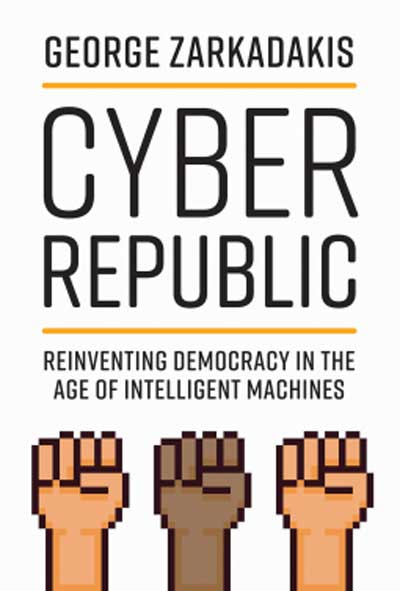Cyber Republic book by George Zarkadakis takes us into a future that may still be too far, but whose glimpses are evident in our current world. As technology leaps at a breathtaking pace, our world is on the cusp of phenomenal change, a change that is inevitable. And the best way to protect our societies from this change is to understand the impact of these changes and prepare not for what’s coming.

Cyber Republic: Reinventing Democracy in the Age of Intelligent Machines
Author: George Zarkadakis
Publisher : The MIT Press; Illustrated edition (September 22, 2020)
Hardcover : 176 pages
ISBN : 0262044315, 978-0262044318
What is Cyber Republic Book About?
In Cyber Republic book, George Zarkadakis talks about a perhaps utopian world where there is no scarcity of material things and there is no work. Although this might sound wonderful, the transition to this world is fraught with many pitfalls.
Around the world, liberal democracies are in crisis. Citizens have lost faith in their government; right-wing nationalist movements frame the political debate. At the same time, economic inequality is increasing dramatically; digital technologies have created a new class of super-rich entrepreneurs.
Automation threatens to transform the free economy into a zero-sum game in which capital wins and labor loses. But is this digital dystopia inevitable?
In Cyber Republic, George Zarkadakis presents an alternative, outlining a plan for using technology to make liberal democracies more inclusive and the digital economy more equitable.
Cyber Republic Book Review
The book takes a peek into the future that will be dominated by machines. A future where there won’t be any ordinary jobs and there will be machines to fix other machines.
Now, imagine there is nothing to work on, humans have no skills that cannot be emulated by machines. There is no task that humans do that the machines cannot. Who controls whom in this scenario?
Although this seems like an exciting Sci-Fi movie, the author is not Zhat Vash warning you about annihilation by synths. He is predicting problems for government and governance in the near future.
Problems that technology is already causing us with rampant use of bots by political parties and enemy countries to influence people’s opinions and outcomes of elections and public opinion.
As we move forward on this path, more laborious jobs will be eliminated, resulting in widespread unemployment, and the transfer of power will shift from the masses to people who own and control technology.
The author shows with examples how this shift will create further inequality in distribution of wealth, and weaken the voice of people in democracies and governance.
While the author paints a dystopian scenario, he also shows us how we can keep our principles alive and thriving by using technology in the right way. The author suggests different ways governments can keep people involved and make wealth distribution equitable .
The author stresses that technology can be a boon to us all and we can use it to improve our lives, and aim for higher targets in a post-work world. A world where machines and humans collaborate to further our advance like never before.
Overall, a must read book for anyone who wonders how the advance of thinking machines will impact our world and our social systems – beyond the dystopian movies.